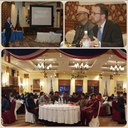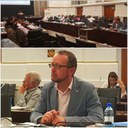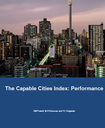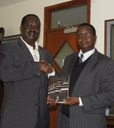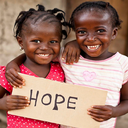Yesterday, the Dullah Omar Institute and the Consul General of India in Cape Town hosted an event in remembrance Dr Ambedkar, the founding father of the Indian Constitution, and recognising the latter's impact on the South African constitution. The theme of this event was: Celebrating Constitutionalism in India and South Africa. The event was opened by the Prof Tyrone Pretorious, the Rector and Vice Chancellor of UWC.
The Dullah Omar Institute’s Dr Aquinaldo Mandlate’s and other experts from Angola and Norway jointly edited a book titled Direitos Humanos num Relance (Human Rights In A Nutshell), which was launched in Luanda (Angola) in April 2016. The book was published by SILABO and it is Portuguese version of the Human Rights in a Nutshell publication by Associate Prof Njal Høstmælingen, Director of the International Law and Policy Institute in Norway.
The Dullah Omar Institute invites you to a colloquium and book launch on Monday, 16 May 2016 (15h00-18h00) at the Kader Asmal Moot Court, Faculty of Law, University of the Western Cape.
The Dullah Omar Institute’s Doctoral Candidate, Shehaam Johnstone presented at the 15th International Winelands Conference (during 31 March and 1 April 2016), hosted by the University of Stellenbosch.
The book Kenya-South Africa Dialogue on Devolution, edited by Professors Nico Steytler and Yash Pal Ghai, was launched on 23 March 2016 at the Katiba Institute, Nairobi, Kenya. The 500 page volume brought together nine South African authors with nine Kenyan counterparts to examine the various aspect of devolution in both countries. The value of the publication lies in how the experience of 20 years of devolution in South Africa can assist in the development of devolution in Kenya, seen in the light that the Kenyan Constitution liberally borrowed from the South African Constitution.
Professor Nico Steytler, the SARChI Chair in Multi-level Government, Law and Policy, was one of the key experts, presenting a 4 day training workshop, organised by the Ministry of Interior and Federal Affairs of the Federal Government of Somalia and the Forum of Federations, in Nairobi, Kenya, 21 to 24 March 2016.
Parliament should urgently address the crisis in inclusive education affecting children with disabilities, Inclusive Education South Africa, SECTION27, Human Rights Watch and the Dullah Omar Institute, University of the Western Cape said today. The groups were responding to President Jacob Zuma’s statement at the national Disability Rights Summit on March 10, 2016, and statements by the Department of Basic Education on March 8.
In 1994, South Africa emerged as a constitutional democracy full of promise for a better life for all South Africans. A system of developmental local government was established which is ‘intended to have a major impact on the daily lives’ of South Africans. Both men and women have an equal responsibility and thus should be given equal opportunities to ‘find sustainable ways to meet their social, economic and material needs and improve the quality of their lives’ [White Paper on Local Government].
On 24 February, Prof Jaap de Visser delivered a presentation to a group of 70 academics, civil society representatives and government officials in Kathmandu, Nepal. The meeting was convened by the Forum of Federations in support of the process to implement the new Constitution of Nepal, which envisages a federal structure and constitutionally recognised local government. Prof De Visser discussed key provisions of the Constitution of Nepal and highlighted the experience of South Africa and other African countries.
This issue of the ESR Review includes three feature articles that discuss various areas of socio-economic rights. Enoch MacDonnell Chilemba analyses various incidents of evictions that took place in South Africa in 2014. There were also court challenges, applications and decisions relating to evictions. The article highlights issues relating to the legality and frequency of evictions.
Dr. Usang Maria Assim, a senior researcher in the Dullah Omar Institute’s Children’s Rights Project, is taking part in the review and planning workshop of the African Children’s Charter Project (ACCP) from 14 to 20 February 2016 in Accra Ghana. The workshop is aimed at reviewing the progress of the ACCP since the start of a two year bridging period in 2015 and planning for the second year (2016) of the bridging period.
Prof Jaap de Visser is taking part in a programme to raise awareness and conduct citizen education around federalism in Nepal. In 2015, Nepal adopted a Constitution creates national, provincial and local levels of government. This was done to accommodate the multitude of ethnicities, languages, religions and cultures in Nepal and to facilitate more responsive government. Nepal is now faced with the mammoth task of implementing this new Constitution.
The Dullah Omar Institute doctoral candidate, Shehaam Johnstone participated in the 1st Annual Emerging Legal Scholarship Conference, where she presented a paper investigating how to hold local government accountable in terms of its constitutional competencies towards realising the right to food. The conference was hosted by the Faculty of Law within the Nelson Mandela Metropolitan University on 4 and 5 February 2016. The theme of the conference, “Legal challenges for a new generation”.
Dr Zemelak Ayitenew Ayele, a former post-doctoral fellow, at the Dullah Omar Institute recently published an opinion article on an Ethiopian newspaper, focusing on public open spaces and our rights to our cities. He argues that the creation of industrial, commercial, or residential areas in and of itself is not problematic. It goes without saying that we need economic development and that our cities have immense contribution to make in this respect, he points out.
On 9 February, Prof Jaap de Visser, the director of Dullah Omar Institute, delivered a presentation duringva workshop organised by the National Council of Provinces (NCOP). The NCOP, as the house of Parliament that brings together nine provinces and organised local government, plays a critical, but often underestimated role. Prof De Visser discussed the role of the NCOP in the adoption of national legislation and its role in holding the national executive accountable.
On 27 January 2016, Dullah Omar Institute’s Civil Society Prison Reform Initiative (CSPRI) unit hosted a civil society workshop aimed at compiling a shadow report to South Africa’s State Report and their response to the List of Issues on the International Covenant on Civil and Political Right (ICCPR) which was submitted to the United Nations Human Rights Committee respectively on 26 November 2014 and 3 December 2015. The meeting was a great opportunity to co-ordinate the drafting of thematic shadow reports by identifying key issues to be addressed.
The Dullah Omar Institute in partnership with the Katiba Institute in Kenya published a book titled Kenyan-South African Dialogue on Devolution. This book includes South African and Kenyan chapters on the reasons for devolution; the levels, number, size and character of devolution units; the demarcation of devolution units; political structures; powers and functions; finances; metropolitan governance; intergovernmental relations; marginalised groups; and transitional arrangements.
On 20 January, the Dullah Omar Institute’s Women and Democracy Initiative organised a meeting for South African Alternate Report Coalition (SAARC) to agree on the main points for the presentation to the United Nations Committee on the Convention on the Rights of the Child (UNCROC). The meeting was followed by a smaller meeting of those who will be going to Geneva in February to introduce them to child participants.
Profs Nico Steytler and Jaap de Visser wrote comparative chapters for the recently published book by the International Development Law Organisation (IDLO), in collaboration with the Kenyan Judiciary Training Institute (JTI) and the Katiba Institute. The book unpacks the role of the Kenyan judiciary in implementing devolution.
Dr Aquinaldo Mandlate from the Children’s Rights Project of the Dullah Omar Institute for Constitutional Law and Governance (DOI) was last week in Mozambique to share the draft Model Law on Eradication of Child Marriages and Protection of Children in Marriage (draft Model Law). Mandlate shared the content of the draft Model Law in a national follow-up workshop on child marriage laws that was held in the Mozambique capital city of Maputo. The workshop was attended by a fairly large audience including members of Parliament, representatives of the Department of Justice, as well as delegates from the Department of Gender, Children and Social Action.
The work at the Dullah Omar Institute is done by researchers of national and international repute. Over the past few months, four of our researchers received academic accolades that bear testimony to the quality research conducted at the Institute. Dr Derek Powell was promoted by UWC to Associate Professor on the basis of his sterling record as a researcher championing interdisciplinary research. Prof Ebenezer Durojaye, Head of the Socio-Economic Rights Project was awarded a C2 rating by the National Research Foundation after a rigorous assessment. The C rating means that Prof Durojaye is an “established researchers with a sustained recent record of productivity in the field … recognised … as having produceda body of quality work”.
The Multilevel Government Initiative (MLGI) of the Dullah Omar Institute for Constitutional Law, Governance and Human Rights, University of the Western Cape is delighted to announce the publication of the Capable Cities Index: Performance. The Performance Index (PI) is the last of the three indices that collectively comprise the Capable Cities Index (CCI). The other two components, the Compliance (Coml) and Capacity (CI) Indices, were published earlier this year.
The Dullah Omar Institute is pleased to announce that a researcher with its Multilevel Government Initiative, Dr Tinashe Chigwata’s article titled "Decentralization in Africa and the Resilience of Traditional Authorities: Evaluating Zimbabwe's Track Record" has been published by the Journal 'Regional and Federal Studies'.
The Multilevel Government Initiative of the Dullah Omar Institute for Constitutional Law, Governance and Human Rights, University of the Western Cape is pleased to announce the publication of the Capable Cities Index: Compliance. The Compliance Index (ComI) is one of three indices that together comprise the Capable Cities Index (CCI).
On 22 October 2015 the DOI and CoE Food Security hosted a roundtable on exploring the link between developmental local government and food security. The objectives of the roundtable were to increase collective analysis and understanding of the extent to which municipalities are fulfilling their obligation towards the right to food and what the roles are for local government in this regard. Approximately 20 participants from academic institutions, state departments, civil society and the private sector attended.
The BRICS domestic agenda, its country impacts, have not been subject to analysis by scholars from the five BRICS countries, whether university-based or those in the public research institutions. This is according to Prof Nico Steytler, South African Research Chair in Multilevel Government, Law and Policy, at the Dullah Omar Institute of Constitutional Law, Governance and Human Rights, University of the Western Cape during the BRICS conference last week.
In March 2015, John Mutakha Kangu graduated with a doctoral degree from UWC. His doctoral study on devolution in Kenya was supervised by Prof Nico Steytler, SA Research Chair at the Dullah Omar Institute.
Cape Town, South Africa, 14-16 October 2015
The Community Law Centre’s Children’s Rights Project is calling for a consultant to produce a concept note for the commemoration of the Day of the African Child (DAC) 2016 on the theme, “Conflict and Crisis in Africa: Protecting all children’s rights”.
The SARChI Chair in Multilevel Government, Law and Policy at the University of the Western Cape is offering four prestigious one year bursaries. The Community Law Centre, as a partner of the Centre of Excellence in Food Security, offers an additional bursary. The bursaries, for full-time study on campus, include study fees, a generous monthly stipend, and IT equipment.









